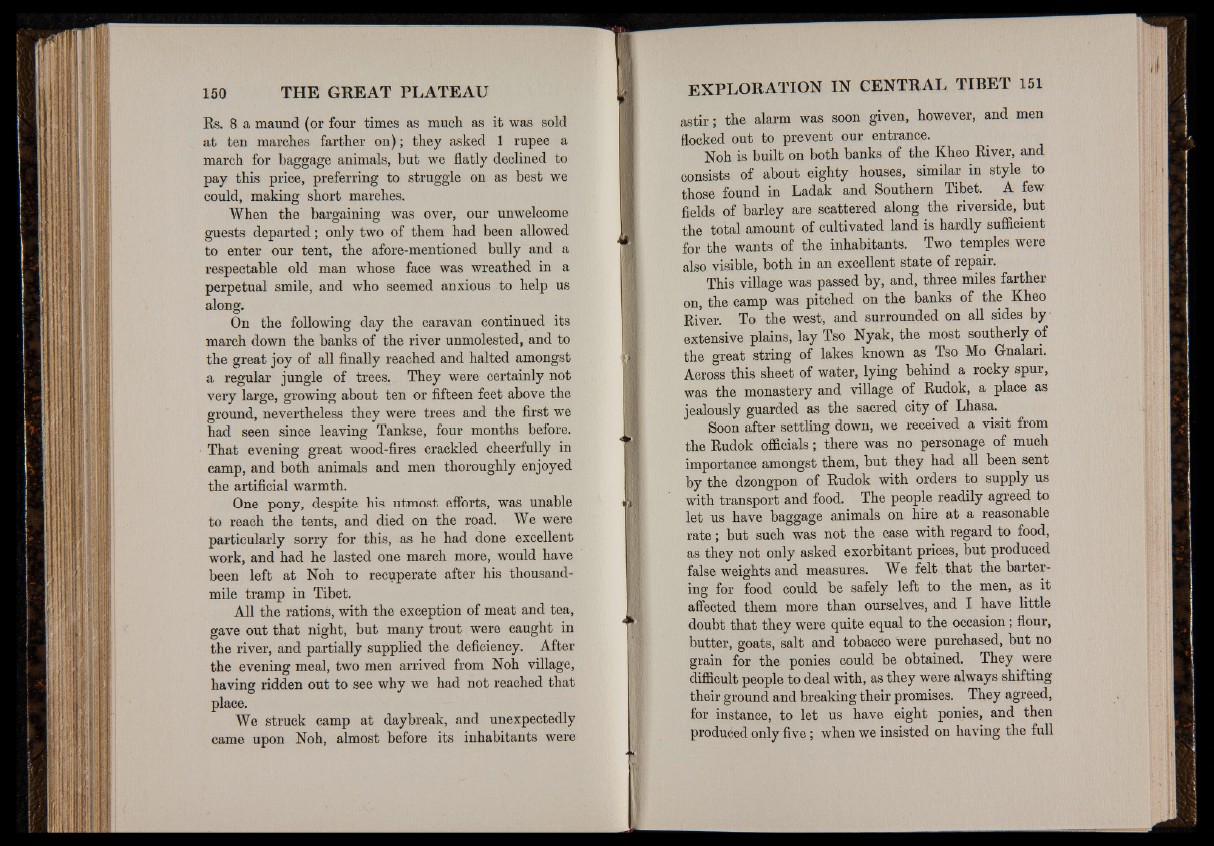
Rs. 8 a maund (or four times as much as it was sold
at ten marches farther o n ); they asked 1 rupee a
march for baggage animals, but we flatly declined to
pay this price, preferring to struggle on as best we
could, making short marches.
When the bargaining was over, our unwelcome
guests departed; only two of them had been allowed
to enter our tent, the afore-mentioned bully and a
respectable old man whose face was wreathed in a
perpetual smile, and who seemed anxious to help us
along.
On the following day the caravan continued its
march down the banks of the river unmolested, and to
the great joy of all finally reached and halted amongst
a regular jungle of trees. They were certainly not
very large, growing about ten or fifteen feet above the
ground, nevertheless they were trees and the first we
had seen since leaving Tankse, four months before.
That evening great wood-fires crackled cheerfully in
camp, and both animals and men thoroughly enjoyed
the artificial warmth.
One pony, despite his utmost efforts, was unable
to reach the tents, and died on the road. We were
particularly sorry for this, as he had done excellent
work, and had he lasted one march more, would have
been left at Noh to recuperate after his thousand-
mile tramp in Tibet.
All the rations, with the exception of meat and tea,
gave out that night, but many trout were caught in
the river, and partially supplied the deficiency. After
the evening meal, two men arrived from Noh village,
having ridden out to see why we had not reached that
place.
We struck camp at daybreak, and unexpectedly
came upon Noh, almost before its inhabitants were
astir; the alarm was soon given, however, and men
flocked out to prevent our entrance.
Noh is built on both banks of the Kheo River, and
consists of about eighty houses, similar in style to
those found in Ladak and Southern Tibet. A few
fields of barley are scattered along the riverside, but
the total amount of cultivated land is hardly sufficient
for the wants of the inhabitants. Two temples were
also visible, both in an excellent state of repair.
This village was passed by, and, three miles farther
on, the camp was pitched on the banks of the Kheo
River. To the west, and surrounded on all sides by
extensive plains, lay Tso Nyak, the most southerly of
the great string of lakes known as Tso Mo Gnalari.
Across this sheet of water, lying behind a rocky spur,
was the monastery and village of Rudok, a place as
jealously guarded as the sacred city of Lhasa.
Soon after settling down, we received a visit from
the Rudok officials; there was no personage of much
importance amongst them, but they had all been sent
by the dzongpon of Rudok with orders to supply us
with transport and food. The people readily agreed to
let us have baggage animals on hire at a reasonable
ra te ; but such was not the case with regard to food,
as they not only asked exorbitant prices, but produced
false weights and measures. We felt that the bartering
for food could be safely left to the men, as it
affected them more than ourselves, and I have little
doubt that they were quite equal to the occasion; flour,
butter, goats, salt and tobacco were purchased, but no
grain for the ponies could be obtained. They were
difficult people to deal with, as they were always shifting
their ground and breaking their promises. They agreed,
for instance, to let us have eight ponies, and then
produced only five; when we insisted on having the full